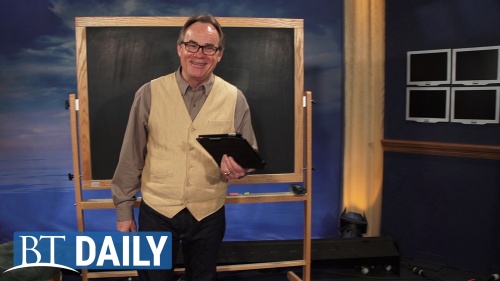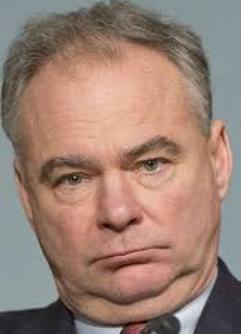 Lucas Gallone/Unsplash
Lucas Gallone/Unsplash
We
need to be reminded that when things go wrong, when danger rises and
when our brother is in trouble, something has to be done. Someone has to
step up.
The Marine Corps’ motto to leave no man behind on the
battlefield packs a powerful lesson in brotherhood, loyalty and courage.
For a Christian this thought was first laid down in the question: “Am I
my brother’s keeper?” The answer is yes, we are. We do have an
obligation toward each other. That obligation presents challenges that
will test our character and can determine a lot about who we are.
Two recent movies treat this theme with two different outcomes. I recently had opportunity to watch both. I can highly recommend them.
The story turns into a rescue mission when the crew learns that their mate lives and they are faced with the decision of whether they will return to Mars and attempt to save the abandoned astronaut’s life. This moment is really the best in the movie. The group of four, safe and on their way home after a long stay in space, unanimously decide to return and make the effort to save their friend. They decide to “leave no man behind.” Here the movie speaks to perhaps the highest and noblest qualities of courage and loyalty. To turn from safety and risk one’s life for another comes the closest on our level to what Christ did when He came in the flesh to rescue man from sin and give the opportunity for eternal life.
The second movie I saw is more controversial. It, too, tells a real life story of courage. But since it deals with real events in the real world, the lines of truth are not as clearly defined. It is also a story still debated in the headlines as Congressional committees, journalists and victims of the dead still seek to understand what happened and who is responsible. It is the story of the September 2012 massacre of United Sates Ambassador Christopher Stevens and three CIA operatives in Benghazi, Libya. The tragedy has now been made into a movie just released a few days ago called 13 Hours. The film’s director claims to have made careful effort to tell the truth of what happened when Islamic terrorists stormed the ambassador’s compound on the 11th anniversary of 9/11. The screenplay is based on a book written by surviving CIA soldiers who were members of the Global Response Staff (GRS) working at a secret CIA installation one mile from the Ambassador’s poorly secured compound.
This story was investigated and gone over in countless news reports and Congressional inquiries. Hillary Clinton, who was then Secretary of State and now a contender for the presidency, was called to answer questions about what she knew and did or did not do during the attack. The movie makes clear that officials at the highest level, including the president, were briefed and made aware of the unfolding events that fateful night in Libya. It also makes clear that additional backup support from the GRS soldiers a mile away was delayed in arriving to help the ambassador’s ill-prepared team. The CIA station chief would not give the order for backup. The additional soldiers had to defy orders to make a run to the compound to save two State Department staff. The ambassador and one staff member were killed in the attack. The CIA soldiers would not leave anyone behind. They went toward the danger, seeking to save their fellow Americans.
The courage of those real life soldiers who ran toward the fire in Benghazi and the science fiction tale of rescue in space are two standout stories. We live in a sterile world where risk is minimized, failure is insured and accountability and responsibility are not always taught in the public arena. We need to be reminded that when things go wrong, when danger rises and when our brother is in trouble, something has to be done. Someone has to step up.
We are our brother’s keeper. We cannot, under any circumstances, leave anyone behind.
Two recent movies treat this theme with two different outcomes. I recently had opportunity to watch both. I can highly recommend them.
We are our brother’s keeper. We cannot, under any circumstances, leave anyone behind.
The first was the movie The Martian. This is a science
fiction story set in the year 2035. A manned mission to Mars is
interrupted by a severe dust storm forcing the crew to an emergency
evacuation on the planet. One astronaut is downed by flying debris,
knocked unconscious and presumed to be dead when no life signs can be
monitored, as telemetry for his life signs was knocked out. The
remaining crew enter their ship and leave him behind and depart for
earth. But he is not dead, only wounded and knocked unconscious. He
recovers and returns to the base station and determines through several
ingenious methods how he can stay alive until the next planned mission
to Mars occurs—at least two years. Meanwhile his fellow astronauts are
on their home ship returning to earth and unaware that he lives. NASA
has made contact but decides not to tell the returning crew they left
behind a live comrade. [If you haven’t seen the movie, skip the next
paragraph as it contains some plot spoilers.]The story turns into a rescue mission when the crew learns that their mate lives and they are faced with the decision of whether they will return to Mars and attempt to save the abandoned astronaut’s life. This moment is really the best in the movie. The group of four, safe and on their way home after a long stay in space, unanimously decide to return and make the effort to save their friend. They decide to “leave no man behind.” Here the movie speaks to perhaps the highest and noblest qualities of courage and loyalty. To turn from safety and risk one’s life for another comes the closest on our level to what Christ did when He came in the flesh to rescue man from sin and give the opportunity for eternal life.
The second movie I saw is more controversial. It, too, tells a real life story of courage. But since it deals with real events in the real world, the lines of truth are not as clearly defined. It is also a story still debated in the headlines as Congressional committees, journalists and victims of the dead still seek to understand what happened and who is responsible. It is the story of the September 2012 massacre of United Sates Ambassador Christopher Stevens and three CIA operatives in Benghazi, Libya. The tragedy has now been made into a movie just released a few days ago called 13 Hours. The film’s director claims to have made careful effort to tell the truth of what happened when Islamic terrorists stormed the ambassador’s compound on the 11th anniversary of 9/11. The screenplay is based on a book written by surviving CIA soldiers who were members of the Global Response Staff (GRS) working at a secret CIA installation one mile from the Ambassador’s poorly secured compound.
This story was investigated and gone over in countless news reports and Congressional inquiries. Hillary Clinton, who was then Secretary of State and now a contender for the presidency, was called to answer questions about what she knew and did or did not do during the attack. The movie makes clear that officials at the highest level, including the president, were briefed and made aware of the unfolding events that fateful night in Libya. It also makes clear that additional backup support from the GRS soldiers a mile away was delayed in arriving to help the ambassador’s ill-prepared team. The CIA station chief would not give the order for backup. The additional soldiers had to defy orders to make a run to the compound to save two State Department staff. The ambassador and one staff member were killed in the attack. The CIA soldiers would not leave anyone behind. They went toward the danger, seeking to save their fellow Americans.
The courage of those real life soldiers who ran toward the fire in Benghazi and the science fiction tale of rescue in space are two standout stories. We live in a sterile world where risk is minimized, failure is insured and accountability and responsibility are not always taught in the public arena. We need to be reminded that when things go wrong, when danger rises and when our brother is in trouble, something has to be done. Someone has to step up.
We are our brother’s keeper. We cannot, under any circumstances, leave anyone behind.
You might also be interested in...
 Lucas Gallone/Unsplash
Lucas Gallone/Unsplash
We
need to be reminded that when things go wrong, when danger rises and
when our brother is in trouble, something has to be done. Someone has to
step up.
The Marine Corps’ motto to leave no man behind on the
battlefield packs a powerful lesson in brotherhood, loyalty and courage.
For a Christian this thought was first laid down in the question: “Am I
my brother’s keeper?” The answer is yes, we are. We do have an
obligation toward each other. That obligation presents challenges that
will test our character and can determine a lot about who we are.
Two recent movies treat this theme with two different outcomes. I recently had opportunity to watch both. I can highly recommend them.
The story turns into a rescue mission when the crew learns that their mate lives and they are faced with the decision of whether they will return to Mars and attempt to save the abandoned astronaut’s life. This moment is really the best in the movie. The group of four, safe and on their way home after a long stay in space, unanimously decide to return and make the effort to save their friend. They decide to “leave no man behind.” Here the movie speaks to perhaps the highest and noblest qualities of courage and loyalty. To turn from safety and risk one’s life for another comes the closest on our level to what Christ did when He came in the flesh to rescue man from sin and give the opportunity for eternal life.
The second movie I saw is more controversial. It, too, tells a real life story of courage. But since it deals with real events in the real world, the lines of truth are not as clearly defined. It is also a story still debated in the headlines as Congressional committees, journalists and victims of the dead still seek to understand what happened and who is responsible. It is the story of the September 2012 massacre of United Sates Ambassador Christopher Stevens and three CIA operatives in Benghazi, Libya. The tragedy has now been made into a movie just released a few days ago called 13 Hours. The film’s director claims to have made careful effort to tell the truth of what happened when Islamic terrorists stormed the ambassador’s compound on the 11th anniversary of 9/11. The screenplay is based on a book written by surviving CIA soldiers who were members of the Global Response Staff (GRS) working at a secret CIA installation one mile from the Ambassador’s poorly secured compound.
This story was investigated and gone over in countless news reports and Congressional inquiries. Hillary Clinton, who was then Secretary of State and now a contender for the presidency, was called to answer questions about what she knew and did or did not do during the attack. The movie makes clear that officials at the highest level, including the president, were briefed and made aware of the unfolding events that fateful night in Libya. It also makes clear that additional backup support from the GRS soldiers a mile away was delayed in arriving to help the ambassador’s ill-prepared team. The CIA station chief would not give the order for backup. The additional soldiers had to defy orders to make a run to the compound to save two State Department staff. The ambassador and one staff member were killed in the attack. The CIA soldiers would not leave anyone behind. They went toward the danger, seeking to save their fellow Americans.
The courage of those real life soldiers who ran toward the fire in Benghazi and the science fiction tale of rescue in space are two standout stories. We live in a sterile world where risk is minimized, failure is insured and accountability and responsibility are not always taught in the public arena. We need to be reminded that when things go wrong, when danger rises and when our brother is in trouble, something has to be done. Someone has to step up.
We are our brother’s keeper. We cannot, under any circumstances, leave anyone behind.
Two recent movies treat this theme with two different outcomes. I recently had opportunity to watch both. I can highly recommend them.
We are our brother’s keeper. We cannot, under any circumstances, leave anyone behind.
The first was the movie The Martian. This is a science
fiction story set in the year 2035. A manned mission to Mars is
interrupted by a severe dust storm forcing the crew to an emergency
evacuation on the planet. One astronaut is downed by flying debris,
knocked unconscious and presumed to be dead when no life signs can be
monitored, as telemetry for his life signs was knocked out. The
remaining crew enter their ship and leave him behind and depart for
earth. But he is not dead, only wounded and knocked unconscious. He
recovers and returns to the base station and determines through several
ingenious methods how he can stay alive until the next planned mission
to Mars occurs—at least two years. Meanwhile his fellow astronauts are
on their home ship returning to earth and unaware that he lives. NASA
has made contact but decides not to tell the returning crew they left
behind a live comrade. [If you haven’t seen the movie, skip the next
paragraph as it contains some plot spoilers.]The story turns into a rescue mission when the crew learns that their mate lives and they are faced with the decision of whether they will return to Mars and attempt to save the abandoned astronaut’s life. This moment is really the best in the movie. The group of four, safe and on their way home after a long stay in space, unanimously decide to return and make the effort to save their friend. They decide to “leave no man behind.” Here the movie speaks to perhaps the highest and noblest qualities of courage and loyalty. To turn from safety and risk one’s life for another comes the closest on our level to what Christ did when He came in the flesh to rescue man from sin and give the opportunity for eternal life.
The second movie I saw is more controversial. It, too, tells a real life story of courage. But since it deals with real events in the real world, the lines of truth are not as clearly defined. It is also a story still debated in the headlines as Congressional committees, journalists and victims of the dead still seek to understand what happened and who is responsible. It is the story of the September 2012 massacre of United Sates Ambassador Christopher Stevens and three CIA operatives in Benghazi, Libya. The tragedy has now been made into a movie just released a few days ago called 13 Hours. The film’s director claims to have made careful effort to tell the truth of what happened when Islamic terrorists stormed the ambassador’s compound on the 11th anniversary of 9/11. The screenplay is based on a book written by surviving CIA soldiers who were members of the Global Response Staff (GRS) working at a secret CIA installation one mile from the Ambassador’s poorly secured compound.
This story was investigated and gone over in countless news reports and Congressional inquiries. Hillary Clinton, who was then Secretary of State and now a contender for the presidency, was called to answer questions about what she knew and did or did not do during the attack. The movie makes clear that officials at the highest level, including the president, were briefed and made aware of the unfolding events that fateful night in Libya. It also makes clear that additional backup support from the GRS soldiers a mile away was delayed in arriving to help the ambassador’s ill-prepared team. The CIA station chief would not give the order for backup. The additional soldiers had to defy orders to make a run to the compound to save two State Department staff. The ambassador and one staff member were killed in the attack. The CIA soldiers would not leave anyone behind. They went toward the danger, seeking to save their fellow Americans.
The courage of those real life soldiers who ran toward the fire in Benghazi and the science fiction tale of rescue in space are two standout stories. We live in a sterile world where risk is minimized, failure is insured and accountability and responsibility are not always taught in the public arena. We need to be reminded that when things go wrong, when danger rises and when our brother is in trouble, something has to be done. Someone has to step up.
We are our brother’s keeper. We cannot, under any circumstances, leave anyone behind.











